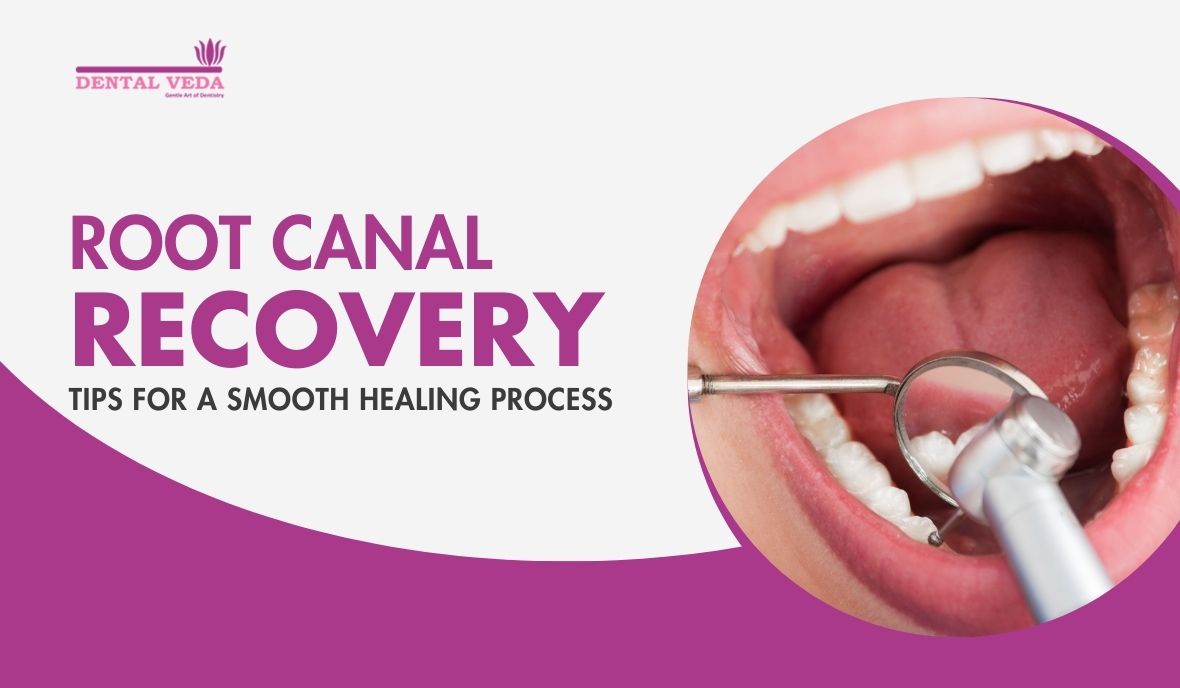Root canal treatment is a dental procedure designed to address severe infections or damage within a tooth by removing infected pulp and nerve tissue from its interior. It is often recommended when the pulp inside the tooth becomes inflamed or infected due to deep decay, trauma, or other dental issues.
Moreover, proper recovery after a root canal procedure is crucial for ensuring the success of the treatment and maintaining long-term oral health. While the procedure itself aims to alleviate pain and save the affected tooth, the recovery period plays a significant role in minimizing discomfort, preventing complications, and allowing the tooth to heal effectively.
Understanding Root Canal Treatment:
Root canal treatment involves several steps to address the infection or damage within the tooth effectively.
- The dentist begins by numbing the affected tooth and surrounding area to ensure the patient’s comfort during the procedure.
- Next, the dentist creates an access opening in the tooth to reach the infected or damaged pulp chamber and root canals.
- The infected or damaged pulp tissue is carefully removed from the tooth interior using specialized instruments, and the canals are cleaned and disinfected to remove any remaining bacteria.
- Once the canals are thoroughly cleaned, they are filled and sealed with a biocompatible material to prevent recontamination and restore the tooth structural integrity.
Purpose of root canal treatment in saving a tooth:
The primary objective of root canal treatment is to save a tooth that would otherwise require extraction due to severe infection or damage. By removing the infected or damaged pulp tissue, the dentist can eliminate the source of infection and alleviate pain while preserving the natural tooth structure. Saving the tooth through root canal treatment allows patients to maintain proper chewing function, preserve jawbone density, and avoid the need for more extensive dental procedures such as tooth extraction and replacement.
Common reasons for needing a root canal:
- Root canal treatment may be necessary in cases of deep decay that has reached the inner pulp chamber of the tooth.
- Trauma or injury to the tooth, such as a crack or fracture, can expose the pulp to bacteria, leading to infection and inflammation.
- Untreated dental conditions such as advanced gum disease or tooth abscesses can also result in pulp infection, necessitating root canal therapy to save the tooth.
Immediate Post-Procedure Care:
After undergoing a root canal procedure, it is essential to take proper care of your dental health to ensure a smooth root canal recovery process. Here is how you can manage discomfort, pain, and swelling, as well as follow dietary recommendations during the initial recovery period:
Managing Discomfort and Swelling:
- Applying ice packs to reduce swelling:
- Over-the-counter pain relief options:
- Avoid strenuous activities that may exacerbate discomfort:
To alleviate swelling and discomfort, gently apply an ice pack or cold compress to the affected area outside your mouth. Wrap the ice pack in a cloth or towel to prevent direct contact with your skin and apply it in intervals of about 10-15 minutes.
Over-the-counter pain medications such as ibuprofen (Advil, Motrin) or acetaminophen (Tylenol) can help manage any discomfort or mild pain following the root canal procedure. Follow the recommended dosage instructions provided on the medication packaging, and consult your dentist or pharmacist if you have any questions or concerns.
During the initial root canal recovery period, it is essential to avoid engaging in strenuous activities or behaviors that could potentially aggravate discomfort or disrupt the healing process. Be mindful of activities such as heavy lifting, vigorous exercise, or biting down forcefully on hard objects, as these actions can put unnecessary strain on the treated tooth and surrounding tissues.
Instructions for Taking Prescribed Medications:
If your dentist has prescribed medications to help manage post-procedure symptoms or prevent infection, it is crucial to follow their instructions carefully. Here are some general guidelines for taking prescribed medications after a root canal:
- Take medications as directed:
- Complete the full course of antibiotics:
- Report any adverse reactions:
Follow the dosage instructions provided by your dentist or healthcare provider, and take all prescribed medications exactly as directed. If you have any questions or concerns about your medications, do not hesitate to reach out to your dentist or pharmacist for clarification.
If you have been prescribed antibiotics to prevent infection, make sure to complete the full course of medication, even if you start feeling better before you have finished all the pills. Skipping doses or stopping antibiotics prematurely can increase the risk of developing antibiotic-resistant bacteria or recurring infections.
If you experience any unexpected side effects or adverse reactions to your prescribed medications, such as allergic reactions, nausea, or dizziness, contact your dentist or healthcare provider immediately for further guidance.
Oral Hygiene Practices:
Maintaining proper oral hygiene is essential for promoting healing and preventing complications after a root canal procedure. Here are some oral hygiene practices to follow:
- Gentle brushing and flossing techniques:
- Using a soft-bristled toothbrush:
- Avoid vigorous rinsing or spitting immediately after the procedure:
Clean your teeth and gums with a soft-bristled toothbrush and gentle brushing technique. Avoid brushing too aggressively, as this can irritate the treated tooth and surrounding tissues. Brush your teeth twice a day using gentle, circular motions, and be sure to brush along the gumline to remove plaque and bacteria.
Opt for a toothbrush with soft bristles to minimize irritation and protect the delicate tissues in your mouth. Soft-bristled brushes are gentle on the teeth and gums while effectively removing plaque and debris from the tooth surfaces. Replace your toothbrush regularly, ideally every three to four months or sooner if the bristles become frayed.
After a root canal procedure, it is important to avoid vigorous rinsing or spitting, especially in the immediate post-procedure period. Rinsing too forcefully or spitting forcefully can dislodge the temporary filling or disrupt the blood clot forming at the treatment site, which is essential for proper healing. Instead, rinse your mouth gently with lukewarm water or a saline solution as directed by your dentist.
Diet and Nutrition:
Following a root canal procedure, it is crucial to choose foods and beverages that are gentle on your teeth and supportive of the healing process. Here are some dietary recommendations:
- Choosing soft, easy-to-eat foods:
- Avoid hard or crunchy foods that may irritate the treated tooth:
- Staying hydrated with water and avoiding sugary or acidic beverages:
Select soft and easy-to-chew foods that won’t put undue stress on the treated tooth or surrounding tissues. Examples include soups, smoothies, yogurt, pudding, mashed potatoes, scrambled eggs, and cooked vegetables. These foods are not only gentle on your teeth but also provide essential nutrients to support healing.
Avoid hard, crunchy, or sticky foods that could potentially cause discomfort or damage to the treated tooth. Avoid items such as nuts, hard candies, popcorn, chips, and tough meats until your dentist gives you the go-ahead to resume your regular diet.
Drink plenty of water throughout the day to stay hydrated and promote healing. Water helps flush out bacteria and debris from your mouth, reducing the risk of infection and supporting oral hygiene. Avoid sugary or acidic beverages such as soda, sports drinks, and fruit juices, as these can contribute to tooth decay and enamel erosion.
Follow-up Care and Appointments:
After undergoing a root canal procedure, it is crucial to stay vigilant about your dental health and attend follow-up appointments with your dentist. Here is what you need to know about follow-up care:
-
Scheduling follow-up appointments with the dentist:
It is essential to schedule and attend any follow-up appointments recommended by your dentist. These appointments allow your dentist to monitor your healing progress, evaluate the success of the root canal treatment, and address any concerns or complications that may arise. Typically, follow-up appointments are scheduled a few weeks after the root canal procedure to ensure proper healing.
-
Monitoring for any signs of infection or complications:
Keep an eye out for any signs or symptoms that may indicate infection or complications following the root canal procedure. These may include persistent pain, swelling, sensitivity to hot or cold temperatures, or the development of a foul taste or odor in the mouth. If you experience any of these symptoms or notice any unusual changes in your oral health, contact your dentist immediately for further evaluation and treatment.
-
Discussing any concerns or questions with the dental team:
Open communication with your dental team is key to ensuring a smooth recovery and addressing any concerns or questions you may have. Do not hesitate to reach out to your dentist if you have any worries or uncertainties about your post-procedure care or recovery process. Your dentist can provide valuable guidance, reassurance, and support to help you navigate the healing journey.
Conclusion
Your oral health is integral to your overall well-being, and prioritizing it can lead to long-term benefits. By following your dentist post-procedure instructions and maintaining good oral hygiene habits, you can support the success of your root canal treatment and enjoy a healthy, pain-free smile.
If you experience any unexpected symptoms, complications, or concerns during your root canal recovery, do not hesitate to contact Dental Veda, the top dentist in Gurgaon. We can provide you with painless root canal treatment in Sushant Lok by our best root canal specialists.


